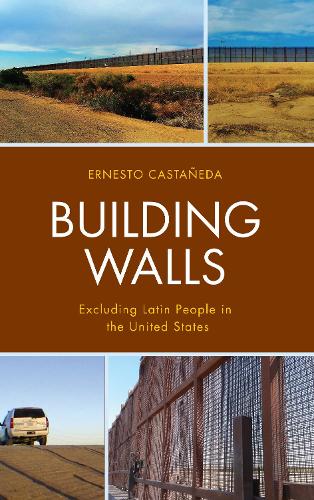
Building Walls: Excluding Latin People in the United States
(Hardback)
Available Formats
Publishing Details
Building Walls: Excluding Latin People in the United States
By (Author) Ernesto Castaeda
Contributions by Silvia Chvez-Baray
Contributions by Eva Moya
Contributions by Maura Fennelly
Contributions by Dennis West
Contributions by Catherine Harlos
Contributions by Natali Collazos
Bloomsbury Publishing PLC
Lexington Books
15th April 2019
United States
Classifications
Professional and Scholarly
Non Fiction
Social and cultural history
Social discrimination and social justice
Ethnic groups and multicultural studies
Migration, immigration and emigration
305.868073
Physical Properties
Hardback
236
Width 162mm, Height 229mm, Spine 21mm
567g
Description
The election of Donald Trump has called attention to the border wall and anti-Mexican discourses and policies, yet these issues are not new. Building Walls puts the recent calls to build a border wall along the US-Mexico border into a larger social and historical context. This book describes the building of walls, symbolic and physical, between Americans and Mexicans, as well as the consequences that these walls have in the lives of immigrants and Latin communities in the United States. The book is divided into three parts: categorical thinking, anti-immigrant speech, and immigration as an experience. The sections discuss how the idea of nation state constructs border, how political strategy and racist ideologies construct the idea of irreconcilable differences between whites and Latinos, and how immigrants and their families overcome their struggles to continue living in America. They analyze historical precedents, normative frameworks, divisive discourses, and contemporary daily interactions between whites and Latin individuals. It discusses the debates on how to name people of Latin American origin and the framing of immigrants as a threat and contrasts them to the experiences of migrants and border residents. Building Walls makes a theoretical contribution by showing how different dimensions work together to create durable inequalities between U.S. native whites, Latinos, and newcomers. It provides a sophisticated analysis and empirical description of racializing and exclusionary processes.
Reviews
Building Walls brings a much-needed critical race analysis to migration studies. Castaeda draws from a wide variety of sources and voices to paint a picture of the exclusion and racialization experienced by people with origins in Latin America who have made their homes in the United States. Expertly weaving in analyses of nationalism, border vigilantism, white supremacy, and immigration enforcement, Building Walls provides a clear and provocative analysis of our contemporary moment. This book would be an excellent addition to courses on race and migration across a wide variety of disciplines. -- Tanya Golash-Boza, University of California, Merced
Despite facing a harsh context of reception, evidence shows that most immigrants today are successfully incorporating into the U.S. Nevertheless, anti-immigrant, and specially, anti-Latino sentiments have seemingly intensified and may have contributed to Trumps presidential victory. Why This book explains it. Castaeda marshals compelling ethnographic, statistical, and historical evidence to show the roots and consequences of the exclusion of Latin people in the U.S. For those who care about the future of the country, Building Walls is a required text. -- Ren D. Flores, University of Chicago
How perfectly fitting that Castaeda has masterfully mapped how detrimental it has been for Latinos when the US has and continues to build walls, as Trump built his campaign and presidency on the promise to build a wall between the US and Mexico. This book is truly timely and relevant because it is a testament of Latino racialization and exclusion, and it demonstrates why building walls does not work to keep immigrants out or to unite a country. -- Celia Lacayo, UCLA
This comprehensive and thoughtful book offers an antidote to anti-migrant scapegoating and dehumanization. Meticulously researched and accessibly written, it shines a light on the long history and contributions of Latinos in the U.S., the cultural richness of the borderlands, and the cruelty of the current deportation regime. By placing claims about the 'border crisis' within a longer history of white supremacy, racial profiling, and discrimination, Castaneda offers an incisive counter-narrative to spectacularized media headlines and politicians' invectives. -- Denise Brennan, author of Life Interrupted: Trafficking into Forced Labor in the United States
Author Bio
Ernesto Castaeda is assistant professor of sociology at American University where he is affiliated with the Metropolitan Policy Center, the Center of Latin American and Latino Studies, and the Center on Health Risk and Society.
